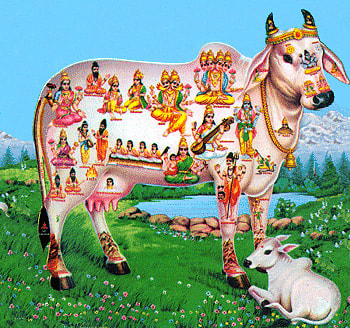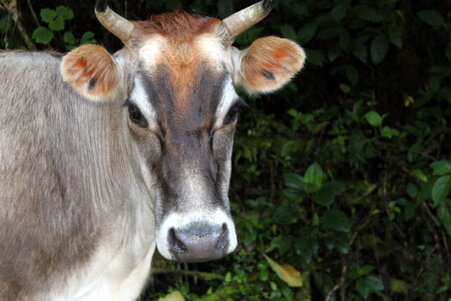Healthy Dairy
The cow, called Gomata (गोमात) in Sanskrit, is considered sacred in the Hindu tradition. There are ancient Vedic hymns praising the cow for its gentle nature which is worthy of emulation for spiritual seekers. The cow has long been valued by cultures throughout the world for its milk, dung, and its ability to help with labor. Particular reverence is given for five sacred substances produced by the cow (the pancha gavya). These are milk, ghee, yoghurt, dung, and urine. Cow dung and urine have a long use in various Eastern and Western cultures for healing. Composted cow dung provides a nearly idea, all-purpose fertilizer and soil amendment for the garden. Dried cow dung has been used as a low smoke and pleasant smelling fuel for fires. It is used also for its purifying properties to smear on houses and as a base for traditional Indian incense. Its smoke is excellent to remove negative energies from places and objects (like a more powerful smudge stick) and the ash produced is worn for protection. Cow urine is sprinkled for purification and consumed for cleaning toxins from the system. Yogurt is prized by Ayurveda as extremely nourishing. The probiotics it contains help aid digestion and the natural defenses of the body. Ghee (clarified butter) is prized above all other cooking oils for its digestibility and healing properties. Milk is viewed by Yoga and Ayurveda as the ideal, sattvic food for nourishing the body and helping to promote a calm mind for meditation. According to Ayurveda, milk should be raw, full-fat, unpasteurized, unhomogenized, and from cattle which are treated well. Because milk is heavy to digest and can contain pathogens and contaminants, it is recommended and milk be always boiled before use, which increases its digestibility and kills harmful bacteria.
There has been a thought for many people from India who have traveled to the West that milk in America is not as healthful as milk in India. Now there are scientific findings that support these claims. Researchers have identified a variation in the proteins within the milk of many modern dairy cows. This mutation creates a different protein known as A1 casein. The older breeds have a predominance of A2 casein which is more digestible and better for health. Many people now have developed lactose intolerance and other sensitivities to milk. This is on account of the A1 proteins in modern milk and also the processing standards for dairy involving giving cattle hormones and antibiotics, homogenization, ultra-pasteurization, and fat removal. Ayurveda recommends fresh, unpasteurized, unhomogenized, full-fat milk for human consumption. Studies have shown that people who are lactose intolerant have considerably less trouble with A2 milk. The cows in India and the heritage breeds actually produce more healthy milk. In America in particular, nearly all the cows used for commercial dairy production are Holstein cattle or contain the genetics of the Holstein cow. Though this breed is capable of eating grass and need not be fed grains, their milk contains high levels of the A1 proteins. The heritage breeds like Milking Devon, Guernsey, Jersey, Highland, and Dexter do not have this genetic mutation which produces the A1 proteins. It is important to work to save the heritage breeds of dairy cow and to promote the health benefits of their milk. We have plans to introduce the rare Milking Devon cow breed to the farm and to work to promote the breed and its superior quality dairy.

